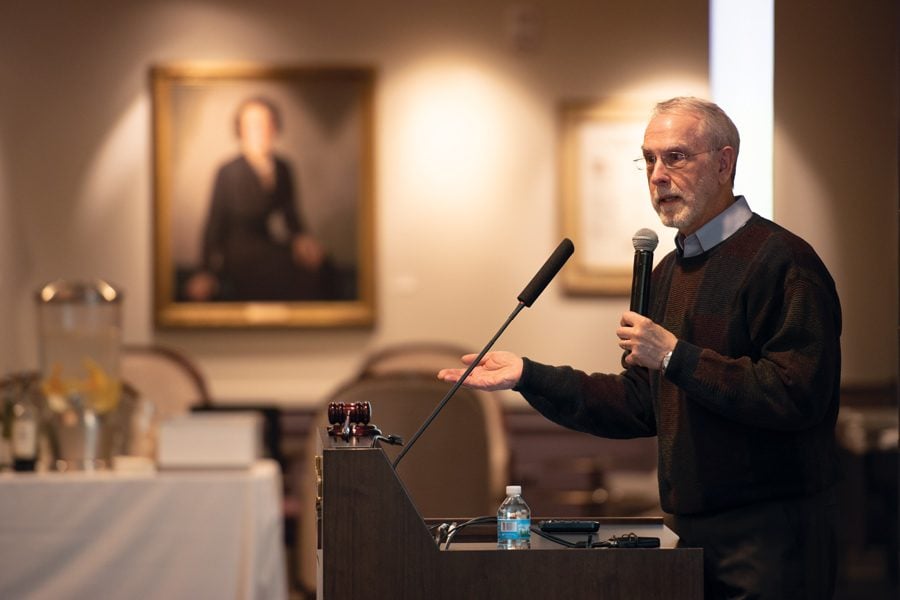Advisory Committee on Investment Responsibility gains traction two years after its founding
Evan Robinson-Johnson/The Daily Northwestern
Feinberg Prof. Philip Greenland, chair of the Advisory Committee on Investment Responsibility. The ACIR has received its first investment proposal over two years after the committee’s founding.
February 24, 2019
Having received its first proposal earlier this year, the Advisory Committee on Investment Responsibility began to gain traction nearly two years after it was founded with a mission to guide ethical investments of the University’s endowment.
The committee, which is designed to encourage social and ethical responsibility in the investment of the University’s endowment, held a public meeting Tuesday, where it heard a proposal from Fossil Free Northwestern requesting the University divest itself of holdings in oil, gas and coal companies.
Northwestern owns stock in Black Stone Minerals, a natural gas and oil corporation, according to a Securities and Exchange Commission quarterly filing earlier this month. Other investments in oil, gas and coal have not been made public, though Fossil Free Northwestern said the University invests nearly $50 million in companies like BP, Noble Energy and Statoil, though it’s unclear how that information was retrieved.
Plans for the committee were first announced in a March 2016 email to students. The University’s Chief Investment Officer, William H. McClean, had floated the idea to form the committee as early as April 2015.
Feinberg Prof. Dr. Philip Greenland, the chair of the ACIR, appeared at Faculty Senate on Feb. 13 to educate faculty on the committee and its goals.
After hearing investment proposals, the ACIR conducts further research on them, including surveying the community’s opinion, then votes whether to pass those proposals onto the Investment Committee of the Board of Trustees through the chief investment officer.
At the Faculty Senate meeting, Greenland emphasized that the ACIR does not formulate proposals itself and can only make recommendations to the Board of Trustees. The Board of Trustees can then choose to accept or reject the proposals.
The 10-member committee consists of two faculty members, selected by Faculty Senate; two staff members, selected by the Northwestern University Staff Advisory Council; two undergraduate students, selected by Associated Student Government; two graduate students, selected by the Graduate Leadership & Advocacy Council; and two alumni, selected by the Alumni Association. University President Morton Schapiro selected Greenland as the ACIR chair this year.
Staff, faculty and alumni members serve two-year terms on the committee, while undergraduate and graduate members serve one-year terms.
Greenland said he views the ACIR’s role as constructive and will facilitate and aid community members concerned with the University’s investments.
“The purpose of the committee is to really help people who are interested in making proposals to get those proposals to the point that they would be most favorably received by the Board of Trustees,” Greenland said.
He added that proposals to the committee should not target specific investments and that the ACIR is trying to develop a broad investment policy instead of directly affecting specific investments. The ACIR will not necessarily make information about University investments more open to the community, Greenland continued, though a proposal could make a request for more transparency.
“We don’t talk about the individual investments,” McClean told The Daily last August, though he said his office would share the amount invested in a single country.
The Northwestern Investment Committee endorsed the ACIR’s establishment in November 2016, also approving a charter instituting the committee’s structure and responsibilities. The ACIR is designed to supplement the UN-supported Principles for Responsible Investment, of which the University is a signatory.
The ACIR resembles investment committees at several other institutions, including multiple Ivy League schools and the University of California system. Kellogg Prof. Ravi Jagannathan, who chaired the ACIR last year and still serves as a committee member, said programs at Yale University, Columbia University and Stanford University were particularly influential.
“It’s really an educational mission in the broader sense of the University,” Jagannathan said, emphasizing the ACIR’s role in developing “constructive” proposals.
The committee is still working on developing its role in the community, said Valerie Bullock, an ACIR member and McCormick PhD candidate, with the proposal from Fossil Free Northwestern allowing the committee to establish its practices.
“This proposal has been an opportunity for us to build internal structure around our procedures,” Bullock said. “This is a very young committee, so we’re having to go in and build a lot of procedures that weren’t initially there, so we can actually do the job that we were elected to do.”
Email: [email protected]
Twitter: @maybejoshirvine
Related Stories:
First proposal submitted to ACIR demands University divestment from fossil fuel companies
Ratings agency identifies bleaker financial outlook for Northwestern


